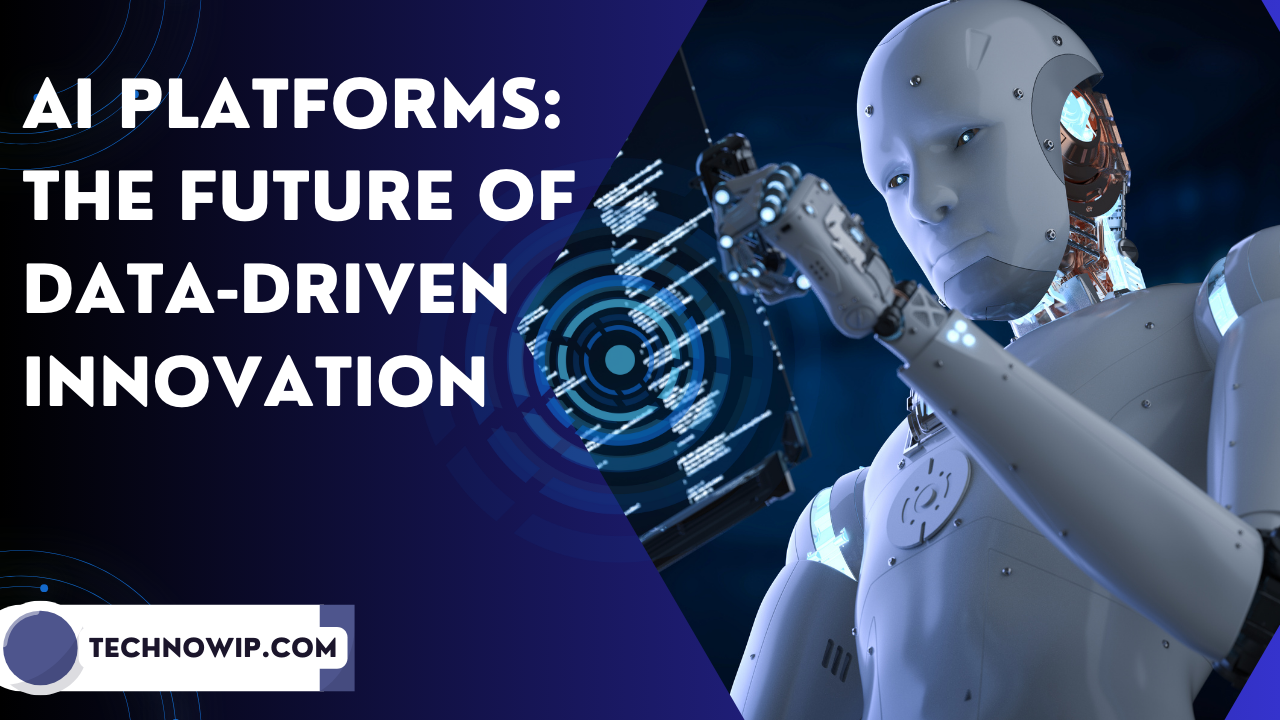Introduction: The Rise of AI Platforms
AI Platforms. With the proliferation of data available today, businesses face an overwhelming task in making sense of it all which can become increasingly overwhelming as more information comes at them every second. AI platforms provide real-time, data-driven insights while aiding better decision making processes transforming industries by offering real-time realignments of data across sectors and supporting better decision processes.
Let’s investigate how AI platforms are shaping the future of data-driven innovation.
Problem: The Data Overload Challenge
1. The Explosion of Data
- We live in an age of information. By 2025, an estimated 463 exabytes will be created daily globally that represents an exponential annual growth rate of 40%!
2. Data Without Action is Wasted
- Many organizations still struggle to manage and utilize all this data effectively, with less than 30% reporting being data-driven in their decision making processes.
- Data silos present another challenge. With data held captive within different departments or systems, extracting meaningful insights becomes much harder.
3. Competitive Pressure to Innovate
- Companies need to innovate faster than ever if they wish to remain competitive. Companies that fail to leverage AI-driven data insights risk falling behind.
- AI platforms offer solutions, but not every company has fully recognized their full potential.
My experience shows me that AI implementation and data quality management pose two distinct challenges to any business adopting these platforms.
Agitate: The Real Impact of Not Adopting AI Platforms
Missed Opportunities and Inefficiencies
- Gartner recently issued a report showing that businesses that do not embrace AI will experience a 25% decrease in profitability when compared with businesses who adopt this technology.
- Traditional data analytics methods are slow, time consuming and inaccurate when compared with AI-powered insights.
The Cost of Decision-Making Delays
- AI platforms help organizations meet real-time data challenges by offering real-time processing of massive datasets that is impossible with traditional manual analysis methods.
Customer Expectations Are Shifting
- McKinsey reports that 71% of customers now expect companies to provide customized experiences, according to AI data analysis services like those used by McKinsey. Without AI’s analysis capabilities, companies risk providing outdated or irrelevant services leading to 53% higher churn rates among their customer base.
Growing Data Complexity
Since data flows from an increasing variety of sources (IoT devices, mobile applications and social media), their complexity continues to multiply at an alarming rate – far outpacing human processing capacity and debilitating systems like IBM Watson AI Platform.
AI platforms fascinate me because of their potential to personalize customer experiences immediately and dynamically. I’ve witnessed first-hand how these AI solutions can accentuate customer interactions on an immediate basis.

Solution: How AI Platforms are Transforming Data-Driven Innovation
AI Platforms in Action
- AI platforms provide all-inclusive machine learning, data processing and real-time analytics under a single umbrella system. With such systems onboard, businesses can process massive datasets quickly while quickly turning insights from those datasets into actionable insights in real time.
Speeding Up Decision-Making with AI Platforms
- AI platforms provide real-time analytics and predictive insights. A logistics company using an AI platform could use these insights to anticipate supply chain disruptions before they happen and redirect shipments without incurring delays.
- Real-time decision-making ensures businesses remain proactive rather than reactive in volatile markets, particularly if decisions must be taken quickly.
Automating Routine Tasks
- One of the main advantages of AI platforms is automating mundane and time-consuming tasks, like reviewing documents for JPMorgan’s COiN platform – something which previously took lawyers more than 360,000 hours each year! By automating such repetitive work, JPMorgan has reduced costs while freeing up human effort for higher value tasks that bring greater returns for its shareholders.
Personalization at Scale
- AI platforms enable companies to efficiently deliver personalized services at scale. Netflix uses AI-powered recommendation algorithms to analyze millions of data points about user behaviors to provide content recommendations at scale that increase engagement by 75% resulting in personalized suggestions that lead to 75% higher user retention levels.
- Amazon’s AI-driven product recommendation system has also played an instrumental role in their global e-commerce dominance, contributing 35% of their annual revenue through personalized suggestions.
My experience shows me that businesses using AI platforms tend to adapt better to changes. Therefore, adopting AI should no longer be considered optional if companies want to remain ahead.
Case Study: AI-Powered Fraud Detection
- Mastercard implemented an AI platform into their fraud detection system and realized a 50% improvement in detecting fraudulent transactions while also significantly decreasing false positives by 60%, leading to less disruption for legitimate customers and significant cost savings for the company.
Improving Customer Service with AI
- Chatbots and AI-driven customer service platforms are revolutionizing customer interactions. On average, customer service departments that have implemented AI chatbots have experienced a 25% reduction in response time and 40% cost reduction, according to Deloitte’s study.
Future-Proofing Businesses
- AI platforms can adapt and learn from the data that flows into them, meaning businesses that use AI today will be better prepared to face future challenges.
- Tesla’s AI-powered autopilot takes in real-time data from millions of miles driven, continually adapting and learning for safer autonomous driving.
Types of AI Platforms
Machine Learning Platforms
- Platforms aimed at aiding data scientists in building, training and deploying machine learning models include Google Cloud AI Platform and AWS SageMaker. Additionally there are Natural Language Processing (NLP) Platforms as well.
Natural Language Processing (NLP) Platforms
- NLP platforms like IBM Watson and Microsoft Azure AI allow businesses to analyze unstructured data such as customer comments, emails and social media posts in order to gain valuable insights from them.
Computer Vision Platforms
- Computer Vision Platforms Clarifai and OpenCV AI platforms specialize in image and video analysis to assist businesses automate tasks such as manufacturing inspections or enhance security through video analytics.
For me, the biggest advantage of AI based platforms is how they save time and reduce manual work. I’ve seen how AI helps companies become more efficient in their operations.
Real-World AI Platform Use Cases
Healthcare Transformation
- Artificial intelligence platforms such as IBM Watson Health are helping doctors make faster and more accurate diagnoses than ever. By using AI to analyze patient records, medical literature, clinical trials data and creating personalized treatment plans – which has shown itself effective against diagnostic errors by 30%!
Retail Industry Disruption
- Walmart uses AI-driven inventory forecasting and optimization systems to anticipate customer demand and manage inventory effectively – this has resulted in a 30% drop in overstock costs as well as improved customer experience due to reduced stockouts.
AI in Agriculture
- Microsoft FarmBeats uses artificial intelligence (AI) platforms such as FarmBeats to gather data from sensors, drones and weather stations in order to help farmers increase yield by up to 20% while decreasing resource use by up to 25% compared with their predecessor platforms. Farmers using such AI-driven platforms have seen yield improvements of 20% while simultaneously decreasing resource use like water and fertilizer consumption by 25% or more.
Challenges in Adopting AI Platforms
Data Quality Issues
- Data Quality Issues Artificial intelligence platforms rely heavily on data input by their users; subpar quality such as incomplete or biased input may lead to inaccurate insights, according to one MIT study illustrating such instances where biased training data resulted in facial recognition systems becoming less accurate at recognizing people of color than expected.
Integration with Legacy Systems
- McKinsey reported that many businesses struggle to integrate AI platforms with existing legacy systems and infrastructure, with 66% of companies citing technical debt or legacy infrastructure as major impediments to AI adoption.
Skills Gap in AI
- One major barrier to adopting artificial intelligence platforms is finding enough qualified workers. While demand for AI experts continues to expand, only 18% of organizations report having enough skilled AI workers available to them for large scale AI deployment, according to research from O’Reilly Media.
Data Privacy Concerns
- Artificial intelligence platforms require large volumes of data in order to operate, raising privacy and security issues. The General Data Protection Regulation (GDPR) sets stringent rules on how companies handle this data, with any violations punishable with fines of up to EUR20 Million or 4% of annual turnover whichever comes first.
As soon as I began exploring AI platforms, I was impressed by their speed in processing data and producing insights – something which caused me to reconsider how businesses could employ technology.
Overcoming Adoption Challenges
Emphasizing Data Governance
- Companies should prioritize data governance to guarantee data quality and security. Netflix has invested heavily in their data governance framework to ensure accuracy, security and compliance with global regulations such as GDPR.
Partnering with AI Solution Providers
- Companies without the technical capabilities to develop and deploy AI platforms rely on AI solution providers as a vital asset. Accenture and Deloitte have emerged as pioneers of offering consulting and implementation services designed to bridge legacy systems to modern AI technology.
Investing in AI Training Programs
- Companies seeking to leverage AI must invest in upskilling their workforce. Amazon Machine Learning University gives employees access to AI/ML training courses that equip them to leverage these platforms effectively in their roles.
Future Trends in AI Platforms
AI Democratization
- Artificial intelligence platforms have become more affordable to small and midsized businesses (SMBs). AutoML tools from platforms such as Google Cloud AI allow non-expert users to build AI models easily making AI accessible even without an army of data scientists on staff.
Explainable AI
- With AI becoming ever more central to decision-making processes, businesses and regulators have come to demand greater transparency from AI models. Explainable AI (XAI) platforms have seen increasing adoption by users to understand how decisions are being made; providing accountability as well as compliance with regulations like GDPR.
AI-Powered Creativity
- Artificial intelligence platforms have moved beyond analytics into creative fields. Platforms such as OpenAI’s DALL-E and GPT models are being utilized to produce everything from marketing copy to product designs ushering in an unprecedented period of AI-powered creativity.
AI platforms have long been recognized as essential to businesses looking to remain competitive, and have fundamentally transformed how data analysis occurs in my experience.
Conclusion: The Competitive Edge of AI Platforms
AI platforms have come a long way over time and now play a prominent role in shaping how businesses operate and innovate. From improving customer experiences to driving operational efficiencies, artificial intelligence platforms will undoubtedly change how business works in the near future.
Companies that adopt AI platforms today will be better prepared to tackle tomorrow’s challenges; while those that resist change could lose relevance. Success lies in understanding AI benefits, managing its challenges effectively, and investing as long-term strategic assets.
FAQS
What Are AI Platforms (also Known As Intelligent (AI) Solutions?)
AI platforms are systems which combine machine learning, data analytics and automation technology in order to help organizations process large volumes of data quickly and make real-time decisions – these solutions may include software like Artificial Neural Networks.
How do AI platforms facilitate better business decision-making?
Artificial intelligence platforms analyze data quickly and efficiently, offering predictive insights that enable businesses to make smarter, data-driven decisions.
Why does data-driven innovation matter?
Data-driven innovation enables organizations to remain competitive by using insights gained from data to optimize processes, enhance customer experiences and develop innovative new products or services.
Can small businesses utilize AI platforms?
Yes, AI platforms have become more accessible to small businesses through affordable cloud solutions that make AI accessible – helping them leverage data without needing large teams of data scientists.
How are AI platforms capable of handling real-time data?
AI platforms process real-time data by continuously collecting and analyzing it, providing businesses with real-time analysis they need to make decisions and respond swiftly to changing conditions.
What industries benefit most from AI platforms?
AI platforms offer tremendous value to industries like healthcare, finance, retail and logistics by improving decision making processes and automating customer experiences for better experiences and personalized interactions with their clients.
Are AI platforms difficult to integrate into existing systems?
Integration can be challenging when dealing with legacy systems; however, many AI platforms provide tools and support to make the process smooth and ensure seamless implementation.
How are AI platforms aiding customer personalization?
Artificial Intelligence platforms enable businesses to understand customer behavior and preferences in order to provide tailored products, services, and marketing initiatives that address individual customer requirements and increase engagement and satisfaction levels.
What are some examples of AI platforms?
Google Cloud AI, Microsoft Azure AI, IBM Watson, and Amazon SageMaker offer tools for data processing, machine learning and automation.
What are the challenges involved with adopting AI platforms?
Principal challenges facing data quality issues, integration with legacy systems, lack of qualified talent and concerns over data privacy and security are key concerns for companies today.

